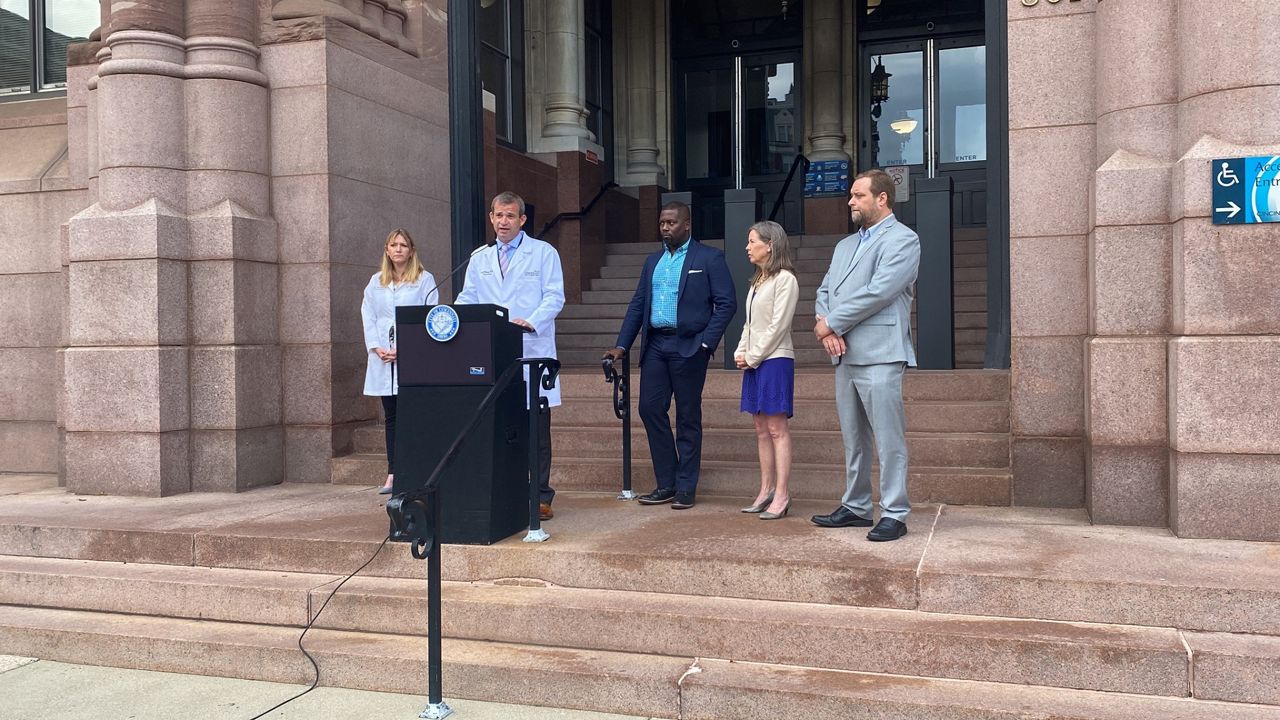CINCINNATI — With a limited supply of the monkeypox vaccine at their disposal, health departments in Hamilton County plan to focus on getting it to the individuals at highest risk of catching the contagious disease.
What You Need To Know
- Cincinnati and Hamilton County received about 350 doses of the monkeypox vaccine
- The health departments plan to focus on those considered "high risk" due to possible exposures
- The city and county both set up websites where residents can sign up for the vaccine
- Those who sign up will be placed in a prioritized queue system
Representatives from the City of Cincinnati and Hamilton County gathered outside City Hall on Tuesday morning to provide an update on the distribution of about 350 total doses of the vaccine.
Both Hamilton County Public Health and the Cincinnati Health Department plan to use this initial supply to vaccinate individuals considered “high risk” based on a tiered risk assessment from the Centers for Disease Control and Prevention (CDC).
Right now, both the city and county will focus on “Tier One” exposures, which include individuals who’ve been in close contact with someone who has monkeypox.
Both the Cincinnati and Hamilton County health departments have set up websites for people to sign up for a vaccine.
Vaccine supplies won’t last long, according to Dr. Grant Mussman, interim Cincinnati Health Commission. He said Franklin County ran out of their initial shipment in a single day.
The CDC bases the number of vaccines portioned to each state based on a risk calculation that includes the active number of cases, Mussman said. He noted Franklin received more doses than Hamilton County because they had “far more cases”.
Greater Cincinnati will receive more doses later this week, Mussman said, but it’s not clear how many Cincinnati or Hamilton County will receive until “they open the box.”
If supplies run out, anyone in the queue who hasn’t received a vaccine gets placed on a wait list, Mussman said
County Commissioner Denise Driehaus described the vaccine rollout as feeling similar to what the city and county experienced during COVID-19. The pandemic forced them to come together to create the infrastructure needed to tackle this new situation, she said.
Driehaus has referred to monkeypox as “Drill 2.”
“We’re in a position to proactively vaccinate people, which is the nature of vaccines anyway,” she added. “(The goal) is really to try to get ahead of things so not so many people get infected.”
While not common in the United States, monkeypox has been on the rise nationwide since May. On Tuesday afternoon, CDC reported 8,934 cases across the country.
In Ohio, the numbers aren’t nearly as high. There are only 68 confirmed cases in states. Four of those are in Hamilton County, including three in Cincinnati, Mussman said.
Council member Reggie Harris, who spearheaded the start of a countywide awareness campaign, credited the collaboration between the city and county with helping to limit spread so far.
Skin-to-skin contact is the most common way to spread monkeypox, but touching fabrics and objects used by a person with monkeypox can also spread it, according to the CDC. The disease causes a rash and can induce flu-like symptoms.
A person is contagious from the time they develop symptoms until their rash has completely healed. That process can take several weeks.
Harris has advocated for a campaign targeting groups known to be at risk of catching monkeypox. While the disease can affect anyone, men who have sex with men have been at greatest risk during the U.S. outbreak.
He and UC Health’s Dr. Jennifer Forrester stressed monkeypox can affect anyone. Forrester called it a “close contact” disease and isn’t explicitly linked to sexual activity.
“Ohio has been lucky in that relative to hotspot states and cities, our numbers have been low,” Harris said. “But we wanted to take the opportunity to make sure that we are keeping those numbers low.”
One major concern for Harris is the availability of testing. He mentioned several residents who told him they’d had difficulty accessing testing. Monkeypox testing only works on a person who has lesions, according to health officials.
Mayor Aftab Pureval is working to convene a meeting with the CEOs of the local health care system to ensure there are “clear pathways for folks to be able to access testing from their primary care doctors,” Harris said.
Despite the rise in cases recently, monkeypox “isn’t prevalent, and it isn’t easy to get here in our community” right now, Hamilton County Health Commissioner Greg Kesterman said. That doesn’t mean people shouldn’t take basic precautions.
Prevention strategies are simple, he said. They include regular hand washing and monitoring your own physical health. That means going to your primary care physical or medical provider when not feeling well or at the sight of a rash or lesion.
Kesterman said the physicians will report positive cases or exposures to the health departments and work to get that person vaccinated.
“If you feel like you've been exposed, it's important to be cautious and to use care when you're going out into the community,” he added.
Find more information on the Hamilton County Public Health and the Cincinnati Health Department websites.



